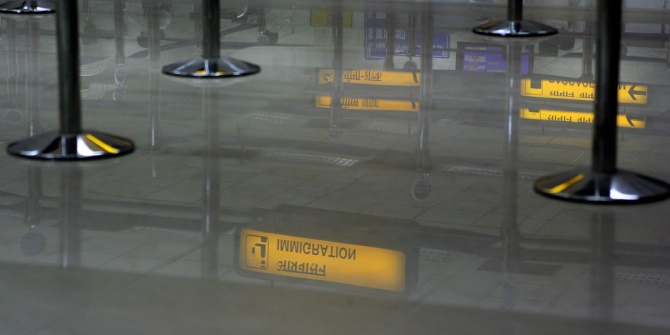 Far from protecting labour markets, Bridget Anderson argues that the clampdown on immigration can have quite the opposite effect. Rather than the high quality, kitemarked work implied by “British jobs for British workers”, UK citizens will be compelled to take on lower quality work.
Far from protecting labour markets, Bridget Anderson argues that the clampdown on immigration can have quite the opposite effect. Rather than the high quality, kitemarked work implied by “British jobs for British workers”, UK citizens will be compelled to take on lower quality work.
Labour spokesman Chris Bryant’s speech on immigration calling on companies to take on more British young people came days after news there had been a leap in zero-hour contracts, a type of contract used by employers whereby workers agree to be available for work but are not given any guaranteed hours. The two issues may seem separate, but in fact are symptoms of the same problem.
The sectors where zero-hour contracts are most prevalent include hotels and restaurants (19% of workplaces), and health (13%). In some occupations it has become the norm: 61% of domiciliary care workers in England were employed on zero-hour contracts in September 2011. It is no coincidence that these sectors are all staffed by lots of migrants.
Employers are becoming the new bad boys of the immigration debate partly thanks to Labour’s attempts to shift the debate on to employment conditions, traditionally more comfortable territory for them than the Conservatives. Nobody likes a grasping employer (though the distinction between this and the legitimate pursuit of profit is far from clear). Research suggests that often employers are acutely aware of the economic and other trade-offs that recent arrivals are willing to make. In sectors such as agriculture, they openly acknowledge that the wages and employment conditions they offer for seasonal work are considered unacceptable to most British workers.
But these problems are not only the result of poor employment practices in individual firms. They are to do with the structure of the British economy. The expansion of the service sector has led to a proliferation of “McJobs” in low wage service occupations, and more generally there has been an increase in temporary and part-time work, including agency work.
The British labour market has seen considerable job polarisation in the past 20 years. Labour market economists Marten Goos and Alan Manning have demonstrated a rise in what they categorise as “lousy” and “lovely” jobs, and a decline in “middling” occupations. Imagine the shape of the UK workforce as changing from a pyramid, with a small number of jobs at the top but a reasonable number in the middle, to an hour glass, with more at the top, but hollowed out in the middle. One consequence of this is that it is very difficult for someone in a “lousy” job to move to a “middling” one, let alone a “lovely” job, meaning opportunities for career development in low waged work are often very limited.
This has implications for labour supply and for migration. It is one thing to take on a poorly paid, insecure job with a zero-hour contract in the expectation of moving on (like many migrants with a “temporary mindset”), and quite another to take it on thinking that this is it for the rest of your life. Plenty of British young people working abroad will take on agricultural jobs when they wouldn’t consider doing this work at home, in large part for these reasons.
Increasingly British people are being put in positions where the welfare safety net is being removed and expectations of long term engagement with the labour market is giving way to the immediate requirements for food, shelter and debt repayment. In this way migrants might be seen to be the canary in the coal mine – the warning sign that all is not right with the UK’s much vaunted flexible labour market. The signs have been ignored for nearly a decade because the labour market concerns of migrants are not seen as relevant to the concerns of citizens except insofar as they compete for work.
Controlling migration is about immigration policy and not about labour markets. Indeed, considering immigration and employment regimes together, one cannot help but be struck by the extent to which they seem to be moving in opposite directions. Regulation of migration is becoming increasingly heavy at the same time as business is freed from excessive regulation – with the exception of immigration. It seems immigration is to be excessively regulated but working conditions are not. Compare the project costs for the enforcement of the National Minimum Wage in 2009/10 at £8.8m, with the budget for the UK Border Agency (not including Customs Detection activity funding) for the same period at £248.6m.
Far from protecting labour markets, this clampdown can have quite the opposite effect. With non-EU workers often tied by visas to particular employers and sectors, and dependent on them for renewals, increased immigration enforcement risks making them more desirable employees than citizens. As EU citizens and other migrants find their access to benefits ever more restricted, they are pushed towards taking on low-paid, poorly protected work. What employers want is shaped in large part by what employers think they can get.
For British workers, the result of treating migrants as competitors for jobs might be surprising. Rather than the high quality, kitemarked work implied by “British jobs for British workers”, UK citizens will be compelled to take on lower quality work. Perhaps this the way the labour market is going: “Migrant jobs for British workers”.
This article was originally published at The Conversation.
Note: This article gives the views of the author, and not the position of the British Politics and Policy blog, nor of the London School of Economics. Please read our comments policy before posting.
Bridget Anderson is Professor of Migration and Citizenship and Deputy Director at COMPAS, primarily working on projects in the Citizenship and Belonging, Labour Markets and Welfare clusters. She has a DPhil in Sociology and previous training in Philosophy and Modern Languages. She is the author of ‘Us and Them: the Dangerous Politics of Immigration Controls’ (OUP, 2013) and ‘Doing the dirty work? The global politics of domestic labour’. She also co-edited with Martin Ruhs, ‘Who Needs Migrant Workers? Labour Shortages, Immigration and Public Policy (2010).![]()








Simple economics declares that an abundance of a resource, causes it to be devalued. Thus, too much immigration, not only deprives those who would GLADLY have any job rather than live on a pittance every week, but lowers the wages of anyone considering applying, both immigrant and native worker.
The jobs you are referring to (the seasonal jobs) are jobs that we used to take on as students in the holidays and at weekends. Those jobs are now being advertised overseas and immigrants are taking them.
We have over a million young people who are unemployed. If they were encouraged to take these jobs as trainee positions, it would give them valuable insight into the jobs industry.
You are merely encouraging corporations to seek cheap labour and exploit both immigrant and the indigenous.
The figures have recently been released:
“British workers’ wages have suffered one of the biggest falls across Europe, according to House of Commons figures.
The average hourly wage has fallen by 5.5% since 2010 – even more than austerity-hit Spain, which has seen a 3.3% drop in the same period.
Only three countries – Greece, Portugal and the Netherlands – have had a steeper decline in pay than the UK”.
We need to cut immigration and further encourage those without employment to take the vacant positions. We used to do it in the past!